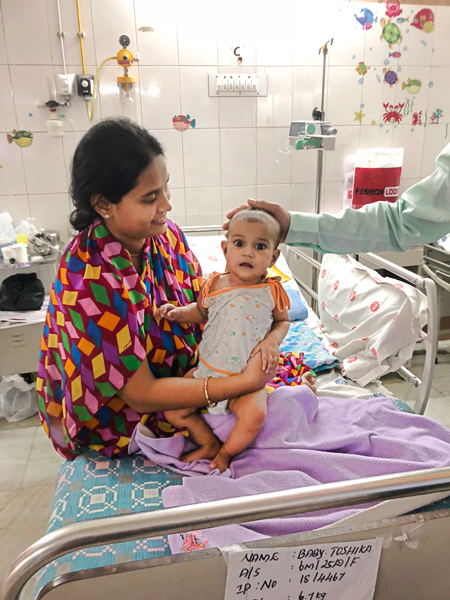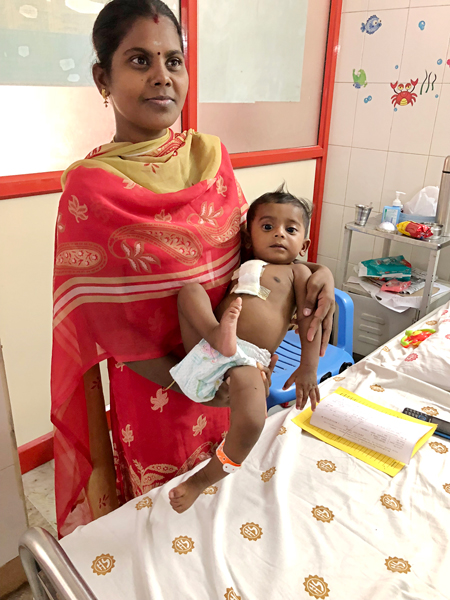RC Madras South finds an angel crusader for its paediatric project
It is a hospital atmosphere alright; monitors are beeping and the beds are filled with tiny children recuperating after heart surgery, evident from the heavy bandaging around their little chests, rising up and down to get in that much-required oxygen. Like 6-month-old little Rushda, a tiny bundle lying on a bed that seems too large for her. Dr Prashant Shah, the paediatric surgeon who operated upon her, is all smiles.
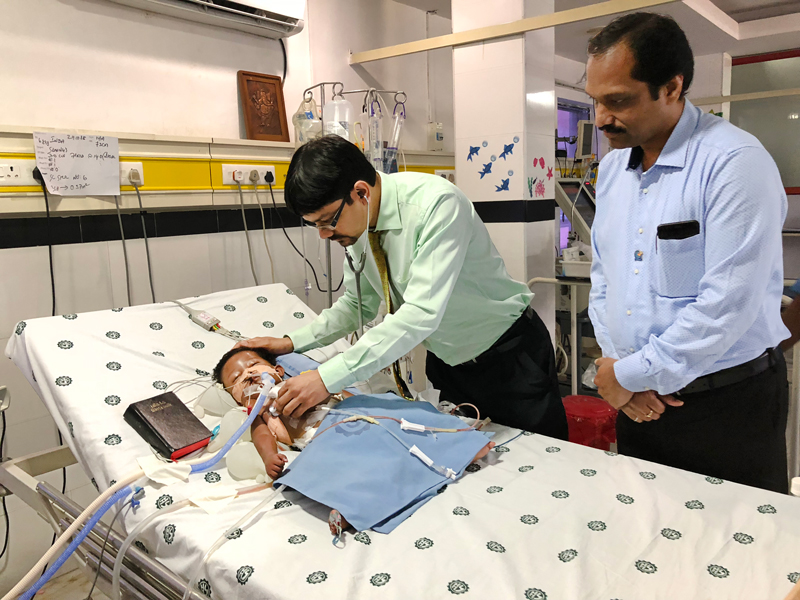
“When she first came to us, she was gasping for breath, as she was getting very little oxygen. Thanks to the double outlet artery and a big hole in the lower two chambers, her oxygen level was only 50–60 per cent when she came, so we had to take her for emergency surgery. As you can see, she is no longer blue; she has done well,” smiles the doctor with satisfaction of a job well done.
On the next bed is lying Inba, all of one year, and weighing 6 kg. Now this is a miracle case indeed at the Paediatric Surgery unit run by Dr Shah at Chennai’s Sooriya Hospital. Inba’s dramatic recovery from the multiple paediatric complications she had, and every breath she now takes, is thanks to Dr Shah, and members of RC Madras South, D 3232, who have initiated this project titled ‘Caring for Little Hearts’.
In a camp Dr Shah’s team had conducted in a small village of Tamil Nadu, Inba was identified as a very blue baby who was evidently having serious complications. “So many hospitals refused to do surgery on her because for one, it was a very complex surgery. And even if some charitable hospital had done it, she was going to need to be hospitalised for a very long time. And we knew that even if we manage to do a successful surgery thanks to Rotary support and the Tamil Nadu government giving us ₹1 lakh under its medical insurance scheme, she would have to stay in the ICU for 10 to 15 days and that really pushes up the cost,” says Dr Shah.
Ford Motors is our corporate partner and have given ₹12 lakh, which has gone into our global grant.
– R Saravanan, President RC Madras South
R Saravanan, President of RC Madras South, who is passionately involved in this project, which has till now helped the surgery of over 200 children, explains that under the Tamil Nadu Chief Minister’s insurance scheme, BPL (below poverty line) families which possess an insurance card are eligible for assistance up to ₹1.22 lakh for heart surgery depending on the complication.
The beginning
He explains that the club, which has 73 members, started this project in August 2017, when he was president-elect, with its own funds. “We wanted to go in for a global grant but since we didn’t know the nuances of how to go about it, we decided to begin anyway with our own funds.” During the first phase, till November 2017, the club raised ₹20 lakh from its members and from that money managed to get 77 little hearts mended through some of the most complicated heart operations done by Dr Shah’s team.
It applied for a global grant in July 2017 and identified a partner in RC Pasadena, US, RI District 5890. The modus operandi was simple; “we sent out mails to various Rotary clubs all over the world. RC Pasadena did not respond, but one club we sent the mail to referred us to RC Pasadena. While our club is doing a GG after a very long time, for them this is their first GG. It’s a very rich club which will be celebrating its centenary next year and we will be celebrating our diamond jubilee next year,” says Saravanan. The grant which came through in Feb 2018 is for about ₹56 lakh.
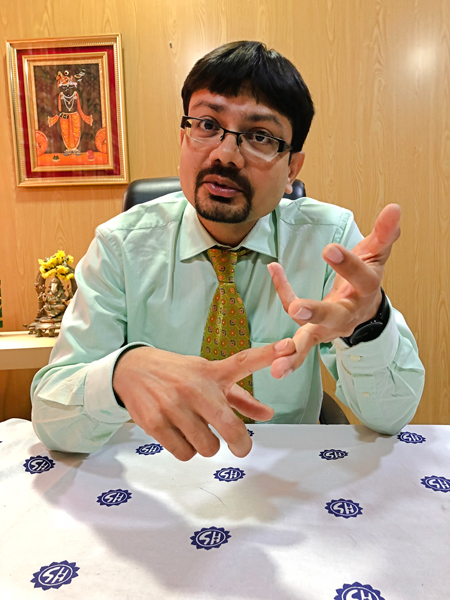
There is an explanation for Saravanan’s passion for mending these little hearts. In March 2014, this chartered accountant had a heart attack, and investigation found he had several blocks for which stents were fitted on him. “After my discharge, when I resumed work, I had a weird feeling. Such occasions invariably result in a bout of depression and you consider the consequences of your death. I got a second chance because I was able to afford the expensive treatment; but what about those who can’t afford it, I kept asking myself,” he muses.
Saving lives vs profit
Returning to little Inba and her long stay in the ICU, and the fact that she will have to stay there for another week, and will need another surgery, I ask Dr Shah whether he is able to break even. “No, we are not, but our aim is not to think of the economics first, and that’s why we are generating an international market such as Iraq (see box). Normally when people put up big hospitals with good infrastructure, they first think of the returns. But here profit is not the motive.”
It is a very costly affair to start and run a paediatric cardiac hospital and perform complex operations. But when you want to do something good, profit can’t be the only motive.
– Dr Prashant Shah, Paediatric Surgeon
We next move to the ward where the children are kept after surgery. It exudes cheer despite babies crying in the arms of their mothers… there are colourful balloons, Donald Ducks and similar paraphernalia, all over the ward.
At Sooriya, Dr Shah offers three slabs; where the TN government pays ₹82,000 for the surgery, the surgery costs ₹1.25 lakh, and RC Madras South pays the rest. In more complicated cases the cost is ₹1.5 lakh; the government gives ₹1 lakh under the insurance scheme, Rotarians pay ₹25,000 and another Trust gives ₹25,000. The highest package of ₹1.72 lakh is for more complicated operations; here the government gives ₹1.22 lakh and the club pays ₹50,000.
Saravanan explains that the club has brought on board Ford Motors which sponsors part of the cost of surgery from its CSR funds. “They are our partners and have given ₹12 lakh to help these operations, which is our contribution in the GG,” he adds.
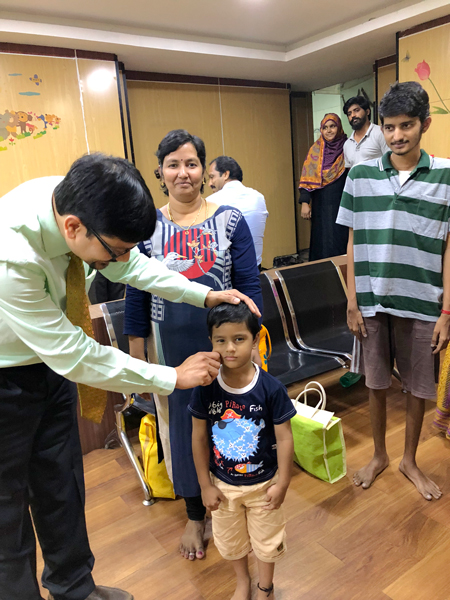
The disease
Dr Shah’s team regularly organises camps in rural areas of Tamil Nadu to identify needy children. In Chennai, the surgeon points out, the majority of children who are born with cardiac complications get the benefit of speedy diagnosis and some kind of treatment. But this is not so in rural areas, so his team reached out to villages through camps and identified children with cardiac complications. “Those who had a government insurance card were given preference for surgery.”
Also, in this southern State, where healthcare services are comparatively decent, there is a central registry where data is stored about children born with congenital defects. After examining this data, Dr Shah chooses a place where many children have such heart problems to set up the medical camp. From his 15-member team, a couple of members go and in partnership with the local NGOs identify the children who require immediate attention. Now that Rotary is a partner, the club spreads awareness about this camp.
I got a second chance after my heart attack because I could afford the expensive treatment; but what about those who can’t afford it, I kept asking myself.
– R Saravanan, President, RC Madras South
Once his team has identified a patient for surgery, he sends a mail with all the medical details of the patient, the child’s picture, the family background and the government insurance cover details. “We have formed a team in our club for this project; once the team approves, the doctor is given a go-ahead,” says the club president.
World over, the incidence of congenital heart disease is 8 to 9 cases per 1,000 live births, which adds up to a huge number. Dr Shah says that congenital heart disease and resultant mortality is one of the reasons why India’s IMR (Infant Mortality Rate) “is not coming below 44 per 1,000. We have so many government hospitals, including special ones for children, but we are not able to provide paediatric cardiac surgery to many children for various reasons. It is a very costly affair to start and run a paediatric cardiac hospital and perform complex operations,” he says, adding, “but when you want to do something good, profit can’t be the only motive.”
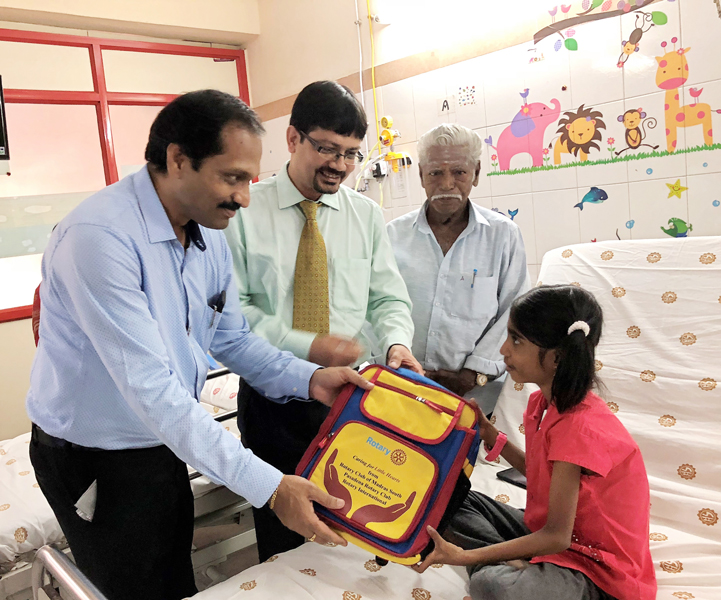
On the heart defects that children are born with, Dr Shah says these are mainly related to a blue baby which means there is some problem with the connections in the heart which restrict the supply of oxygen and the baby turns blue. Then there are defects in the chambers of the heart and the valve, such as “narrowing, leaking, and in certain cases there are multiple defects in one child. If a child is born with very low oxygen levels and hence is very blue, we have to operate within a month, or else its life will be in danger. And surgery for neonates is very complex.” Even though he takes up complex surgical cases, the mortality rate is less than one per cent in this hospital. “And in the operations we have done with Rotary’s help, not a single child has died,” he adds.
It is very obviously a lot of hard work, and the involvement and help from the Government of Tamil Nadu, Rotary and the other Trust which support his work are essential. A lot of labour for little money; what got him hooked to such work, I persist.
Dr Shah smiles in response, and says, “When I took up cardiac surgery it became my passion, and I had to decide whether I would specialise in adult or paediatric surgery. The beauty of cardiac surgery is that every case is interesting and challenging and as a surgeon I simply loved the more challenging cases. I was certain if my intention is good, god will be with me and I will get help. And that has happened!”
While the children get subsidised treatment here, how do the parents manage, because as they come from villages and hail from the poorest of poor classes, finding even low-cost accommodation would be a challenge, I ask him. To this query Saravanan answers with a smile: “When we came in, and as we go up to the ICU and the ward, please look at the people in the corridors. While in the ward the mother stays with the baby, the father or other relatives are allowed by Dr Shah to stay in the corridors or any corner in the hospital, provided they don’t disturb anybody. How many private hospitals will allow that?”
Adds Dr Shah, “Oh yes, they don’t have to spend any money for their accommodation and have to only organise their food.” And they don’t mind sleeping anywhere within the hospital. Their first priority is to find a cure for their child; and they gladly take 10–15 days of discomfort in their stride.”
Overall, Dr Shah, who started operating on children in 2009, has done 4,500 surgeries in various hospitals, including overseas, and “we keep track of all the kids. We don’t think after operating our job is over; some of these kids have completed college and we plan to employ a few, because they know what suffering congenital heart disease brings and will be able to help us identify cases in peripheral areas.”
Pictures by Rasheeda Bhagat
A mother goes mad with joy
The story of 3-year-old Cyrus is gripping. When the baby was born, “for three days the hospital staff didn’t tell me anything. The fourth day they did a blood test because he had high fever and was breathless,” says his mother Amala. After keeping the baby in an incubator for a couple of days saying it had jaundice, the parents were asked to take the child to the Institute of Child Health in Chennai. “There they kept my baby for four days and said it has a hole in the heart, they can’t operate on such a small child, so bring him back when he is older.”
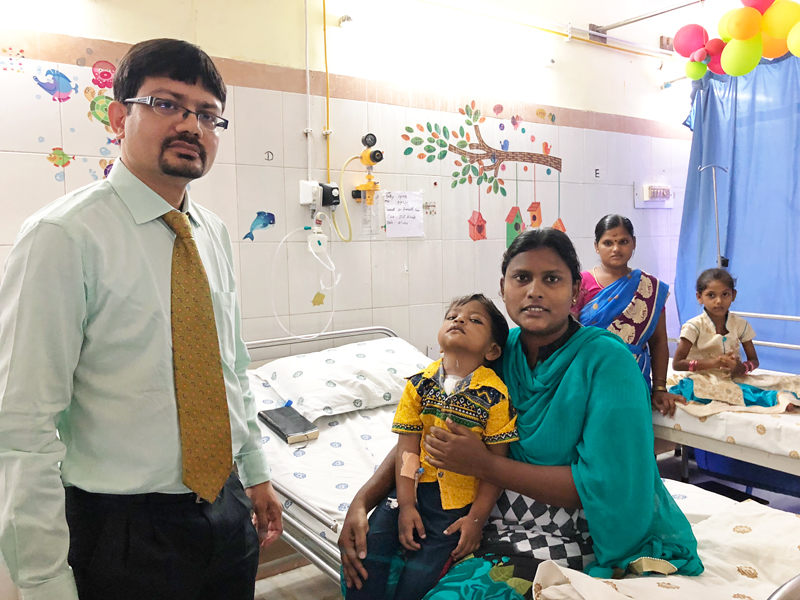
Unable to control her sobs Amala says that as the child got worse, “we took him to another private hospital where the doctor was so rude. He said this child is a waste of time, take him home, I can give you a written guarantee he will not live even for 45 days; why did you bring him?”
Then an NGO referred her to Dr Shah, “who comforted me saying don’t be afraid. Nothing will happen to him. I may have to do a few operations, but he will be alright.”
Explaining the child’s condition, Dr Shah says “the child had no lung artery at all, so we had to construct it. There were several little vessels that were supplying blood to the heart and that’s why he was surviving.” He thought he’d give the child some time and do the surgery after 6 to 8 months. Surgery was scheduled after eight months or so but “by the sixth month he became even more blue so we did a shunt surgery in July 2017, and this time constructed the complete pulmonary artery.”
Amala was initially told Cyrus might need five operations, but after the second one, “when Dr Shah told me no more operations were needed I became like a mad woman with joy and my husband (who works in an auto showroom in Chennai) had to ask me to be sensible! For me after god, it is Prashant Sir!”
Adds Dr Shah, “I had earlier thought he’d need five operations because his anatomy was such but we took a chance, and then god helps.”
Helping Iraqi kids with heart problems
As we approach the paediatric surgery unit headed by Cardiac Surgeon Dr Prashant Shah in Sooriya Hospital in Chennai, you can’t but notice the piles of cardboard cartons cramping the various rooms on the admin floor. “I apologise for this, but in three days I am leading a team to Karbala, Iraq, to do heart surgery on some 25 to 30 children,” smiles Dr Shah.
He explains that he also operates in Mauritius and this is his fourth visit to Iraq, where the children face the same type of congenital heart problems as we find in India. On every visit his team operates on 25 to 30 children; “there are huge numbers of children with similar problems there. We have planned 30 surgeries during our 10-day stay in Karbala. You see all these boxes because we have to carry the latest equipment.”
They are exporting technology to Iraq, comments Saravanan.
Actually, it is humanity that they are exporting to Iraq, I add!
Dr Shah smiles and says, “When we do these medical missions in Iraq, we say in all communications and labels that it is an Indian mission to Iraq, and not Dr Shah’s mission.”
The idea came to him when he visited a friend who runs a medical tourism company in Iraq, who told him so many patients went from Iraq to India for medical treatment and surgery. “But there were so many more who couldn’t afford to travel to India. So I said let me come and see the set-up. I saw the set-up and facilities at the hospital run by the Imam Zainilabideen Trust and was amazed to find them so good and modern. I haven’t seen such a set-up even in Chennai.”
While the congenital heart problems in Iraqi children are similar to those found in India; there are many cases of birth defects because the mothers have ingested a lot of gunpowder.
During his three previous visits he has operated on 62 children, with the cost of all material and equipment being paid by the Iraq Trust. Though he sees the same kind of congenital problems that he sees in children in India, sadly he also sees congenital birth defects in the child because the mother has ingested a lot of gunpowder during her pregnancy.
On whether he feels safe in Iraq, which continues to be rocked by violence, Dr Shah says: “Very safe; even at night women can move freely without any fear. That is the beauty of that place called Karbala.”
A Gujarati who is a strict vegetarian, and that too one who needs gluten-free food, how does he manage? He smiles and says, “My focus is only to operate on the children. We stay near the hospital and our schedule is hectic; we start around 8 am and finish only by 9 pm. I take only their rice and curd and mix it with some podis I take from here. It’s better to be on a bland diet when you are working so much! And I am in the ICU most of the time!”
During the little free time he gets he goes to the Imam Hussain shrine complex; “it doesn’t matter what religion you belong too. That place gives you so much peace,” he adds.

